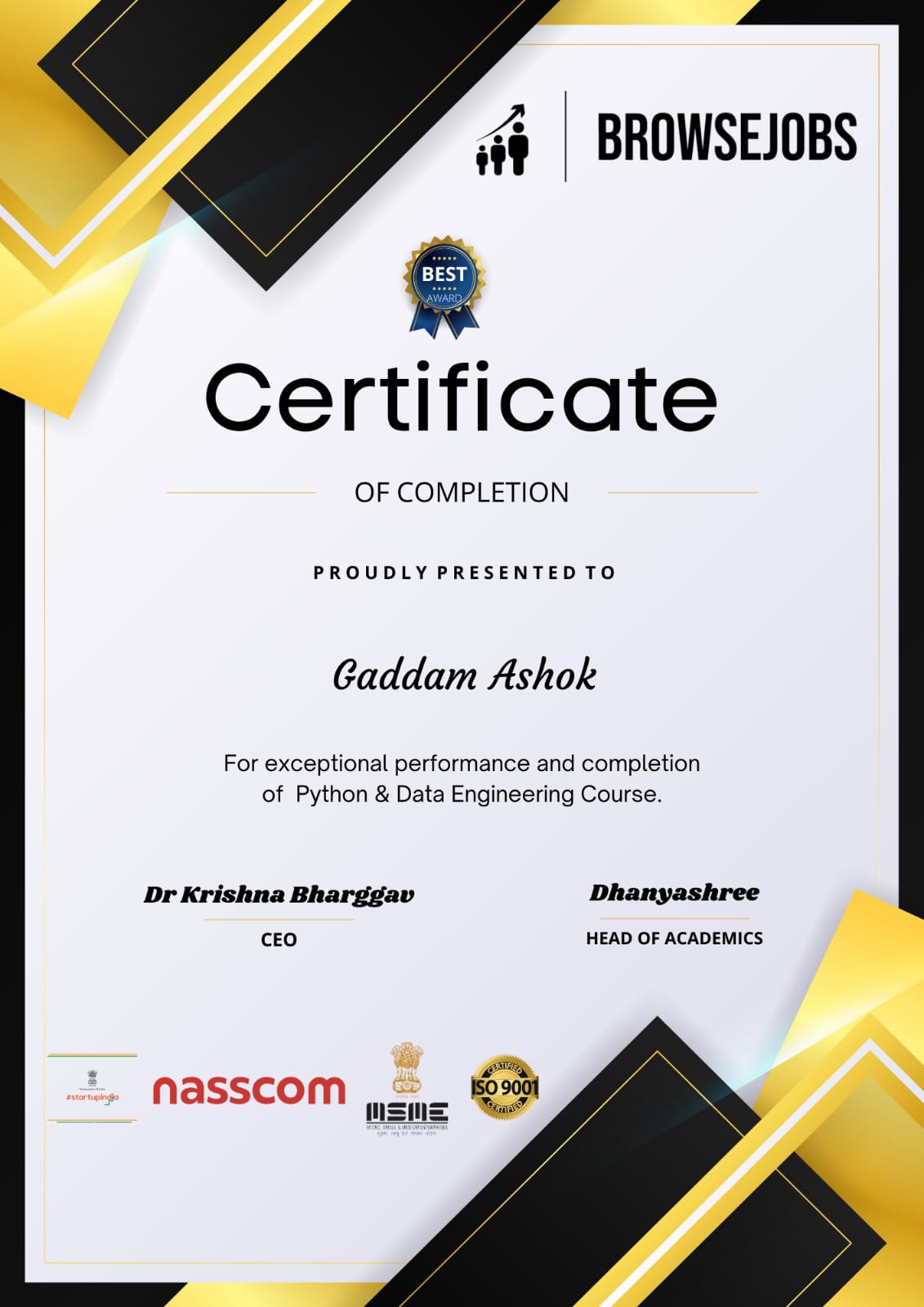Data Engineering
Become a Skilled and
Job-Ready Data Engineering
Mentorship by industry experts
Job-ready portfolio of IO capstone projects
Ticket to fast-tracked career growth in data science
Opens doors to a wide range of Data Engineering job opportunities


Discuss With A Career Advisor
Not Sure, What to learn and how it will help you?
What is data engineering?
Data engineering is a field within data science and computer science that focuses on designing, building, and maintaining systems and infrastructure for collecting, storing, processing, and analyzing large volumes of data. Data engineers work closely with data scientists, analysts, and other stakeholders to ensure that data pipelines are robust, efficient, and reliable, enabling the organization to derive valuable insights from their data.
Key aspects of data engineering include:
Overall, data engineering plays a critical role in enabling organizations to leverage their data assets effectively for decision-making, product development, and strategic planning. By building robust data infrastructure and pipelines, data engineers empower data-driven insights and innovation within the organization. Why learn data engineering?
Data Storage
Secure and scalable storage solutions designed to handle structured and unstructured data. Whether you need real-time access or long-term archiving, our platform ensures your data is always available and protected.
Data Integration
Seamlessly connect multiple data sources and ensure consistent, clean, and synchronized data across your systems. Integration pipelines support APIs, flat files, databases, and real-time data streams.
Data Processing
Transform and enrich your raw data with powerful processing workflows. From batch ETL jobs to real-time stream analytics, we help you unlock actionable insights faster.
Data Quality and Governance
Maintain accuracy, consistency, and reliability of your data with automated validation and governance frameworks. Ensure compliance and establish full data traceability.
Scalability and Performance
Easily scale your data infrastructure as your business grows. Our optimized architecture ensures high performance under heavy workloads without compromising reliability.
Monitoring and Analytics
Get full visibility into data operations through detailed dashboards and alerts. Monitor data flow, performance metrics, and trends in real time to make informed decisions.
Learning data engineering offers numerous benefits, both for individuals and organizations. Here are some of the key reasons why learning data engineering is valuable:
Overall, learning data engineering provides individuals with the skills and knowledge needed to succeed in a rapidly evolving and data-driven job market, while also enabling organizations to unlock the full potential of their data assets.
Lucrative Career Opportunities
Data engineering skills are highly sought after, leading to attractive career opportunities and competitive salaries. Data engineers are in high demand across industries such as technology, finance, healthcare, e-commerce, and more.

Contribution to Data-Driven Culture
Data engineers play a crucial role in establishing and maintaining a data-driven culture within organizations. By building robust data pipelines and infrastructure, they enable data scientists, analysts, and decision-makers to derive valuable insights from data, leading to better-informed decisions and improved business outcomes.

Versatility and Transferable Skills
Data engineering skills are highly transferable across industries and domains. Whether you're working in finance, healthcare, retail, or any other sector, the fundamental principles of data engineering remain the same. This versatility opens up opportunities for professionals to explore different industries and roles throughout their careers.

Opportunity for Innovation
Data engineering provides opportunities for innovation and creativity in designing and implementing data solutions. Whether it's optimizing data pipelines for performance and scalability, implementing real-time data processing, or leveraging emerging technologies such as machine learning and AI, data engineers have the opportunity to drive innovation within their organizations.

Stay Relevant in a Data- Driven World
In today's data-driven world, organizations that effectively harness data have a competitive advantage. By learning data engineering, individuals can position themselves as valuable assets to organizations seeking to leverage data for strategic decision-making and business growth.

Continuous Learning and Growth
Data engineering is a dynamic field that continuously evolves with advancements in technology and changing business requirements. Learning data engineering offers the opportunity for continuous learning and professional growth, as professionals stay updated on the latest tools, techniques, and best practices in the field.

High Demand
There is a significant and growing demand for data engineers in various industries. Organizations are increasingly relying on data-driven decision-making, leading to a surge in demand for professionals who can design, build, and maintain data infrastructure and pipelines.

Career opportunities in data engineering?
Career opportunities in data engineering are abundant and diverse, spanning various industries and sectors. As organizations increasingly rely on data-driven decision-making and digital transformation, the demand for skilled data engineers continues to grow. Here are some common career opportunities in data engineering:
Big Data Engineer
Big data engineers specialize in handling massive volumes of data using technologies such as Hadoop, Spark, and other distributed computing frameworks. They design and implement scalable data solutions to process, store, and analyze big data efficiently.

Data Architect
Data architects are responsible for designing and implementing the overall data architecture and strategy within an organization. They define data models, schemas, and data integration patterns to ensure consistency, scalability, and usability across different data systems and applications.

ETL (Extract, Transform, Load) Developer
ETL developers focus on building and maintaining ETL processes to extract data from various sources, transform it into a usable format, and load it into a data warehouse or other storage systems. They work with tools like Apache NiFi, Talend, Informatica, and AWS Glue.

Data Warehouse Engineer
Data warehouse engineers specialize in designing, building, and optimizing data warehouse solutions. They work with platforms like Amazon Redshift, Google BigQuery, Snowflake, and Microsoft Azure SQL Data Warehouse to support analytics and reporting requirements.

Streaming Data Engineer
Streaming data engineers design and develop real-time data processing systems to handle continuous streams of data from sources such as loT devices, sensors, social media feeds, and application logs. They work with technologies like Apache Kafka, Apache Flink, and Apache Spark Streaming.

Machine Learning Engineer
Machine learning engineers focus on building and deploying machine learning models that leverage large datasets for predictive analytics, pattern recognition, and decision- making. Data engineering skills are essential for managing data pipelines and feature engineering in machine learning workflows.

Cloud Data Engineer
Cloud data engineers specialize in designing and implementing data solutions using cloud platforms such as Amazon Web Services (AWS), Microsoft Azure, and Google Cloud Platform (GCP). They leverage cloud-native services for storage, processing, and analytics, such as AWS S3, Azure Data Lake, and Google BigQuery.

DataOps Engineer
DataOps engineers focus on automating and optimizing data operations processes, including data pipeline orchestration, monitoring, and deployment. They use DevOps principles and practices to streamline the development and deployment of data pipelines and analytics solutions.

These are just a few examples of the diverse career opportunities available in data engineering. With the increasing importance of data in decision-making and business strategy, data engineers play a critical role in driving innovation and success across industries.
Why Choose BrowseJobs?
At BrowseJobs, we’re committed to more than just delivering content; we’re dedicated to providing career-oriented training programs that equip our students with the skills and knowledge they need to excel in the workforce. Our approach ensures that students emerge from our programs with the expertise and confidence of seasoned professionals, ready to make an immediate impact in their chosen field.
Career opportunities in data engineering? How Do We Achieve This?
At BrowseJobs, we’re committed to empowering our students with the practical skills, industry insights, and professional acumen needed to thrive in today’s competitive job market. Join us and embark on a journey towards a successful and fulfilling career.
Tool Proficiency
We provide comprehensive training on essential tools utilized in real-world settings, including Git, GitHub, Agile methodologies, Jira, and Confluence. Mastery of these tools enhances students' productivity, collaboration, and project management capabilities.

Problem-Solving Skills
Our curriculum is designed to expose students to common challenges encountered in professional settings and equip them with effective problem- solving strategies. By tackling real- world scenarios, students develop critical thinking abilities and the resilience needed to overcome obstacles.

Team Dynamics and Collaboration
Understanding the dynamics of team structures and fostering effective collaboration are integral parts of our training. Students learn how to work cohesively within diverse teams, leveraging each member's strengths to achieve project objectives efficiently.

Accessible Curriculum
Our programs are designed to cater to individuals with varying levels of prior knowledge and experience. Whether you're new to IT and computers or seeking to enhance your existing skill set, our curriculum is tailored to meet your needs and facilitate your learning journey.

Real-World Projects
Our training methodology immerses students in simulated real-life projects, mirroring the challenges and dynamics of professional environments. This hands-on experience enables them to develop practical skills that are directly applicable to the workplace.

Communication and Confidence Building
We prioritize the development of communication skills and confidence, recognizing their pivotal role in project success and career advancement. Through interactive exercises and coaching, students learn how to effectively articulate ideas, collaborate with colleagues, and navigate professional interactions.

How is this different to other data engineering courses?
Overall, our data engineering course distinguishes itself by offering a holistic approach that combines technical expertise with soft skills development, practical application, and career readiness, setting our students up for long-term success in the dynamic field of data engineering.
Practical Application Focus
Unlike traditional data engineering courses that primarily deliver theoretical knowledge, our program emphasizes practical application. By simulating real- world projects, students gain hands-on experience, allowing them to transition seamlessly into professional roles upon completion.

Communication and Soft Skills Development
While technical proficiency is essential, we understand the importance of soft skills in a professional setting. Our course not only covers technical aspects but also prioritizes communication, teamwork, and problem-solving skills, ensuring that students are well-rounded and equipped to excel in any work environment.

Tool Proficiency
Many data engineering courses focus solely on technical concepts, neglecting the tools and technologies used in real-world scenarios. Our program fills this gap by providing comprehensive training on industry-standard tools such as Git, GitHub, Agile methodologies, Jira, and Confluence. This ensures that students are proficient in the tools commonly utilized in professional data engineering environments.

Problem-Solving and Critical Thinking
Data engineering is inherently problem-solving oriented. Our curriculum goes beyond theory to present students with real-world challenges commonly encountered in data engineering projects. By honing their problem-solving and critical thinking skills, students are better prepared to tackle complex issues and drive innovation in their future roles.

Tailored Curriculum for All Levels
Whether students are beginners with no prior background in IT or seasoned professionals looking to enhance their skills, our course is designed to accommodate learners at all levels. Our accessible curriculum ensures that everyone, regardless of their starting point, can benefit from our comprehensive training program.

Career-Readiness
Ultimately, our data engineering course is not just about acquiring knowledge; it's about preparing students for successful careers in the field. By providing them with the skills, confidence, and practical experience needed to thrive in professional environments, we empower our graduates to stand out in the competitive job market and make meaningful contributions from day one.

Our Alumni Work in Top Companies
Data Engineering Certificate
On completion of the course, you will be encouraged and assisted to crack 10+ valuable certificates in different domains.

What do our students say about Data Engineering Course?
Syllabus of data engineering ?
Python Intro
Comments
Variables
Data Types
Numbers
Casting
Strings
Functions
Lambda Functions
Booleans
Operators
Lists
Tuples
Sets
Dictionaries
If Else
While Loop | For Loops
Python advanced:
Arrays
Classes | Objects
Inheritance
Iterators
Polymorphism
Scope
Modules
Dates
Math
Booleans
Operators
Lists
Tuples
Sets
Dictionaries
If Else
While Loop | For Loops
Pandas:
Intro
Series
DataFrames
Read CSV
Read JSON
Analyse Data
Cleaning Data
Cleaning empty cells
Cleaning Wrong Format
Cleaning Wrong Data
Removing Duplicates
Pandas Correlations
Pandas Plotting
SQL:
Intro
Classes | Obje⦁ Syntaxcts
Select
Select
Select Distinct
Where
Order by
And | Or | Not
Insert Into
In | Between
Aliases
Insert Into
Null Values
Update
Delete
Delete
Select Top
Min and Max
Count | Sum | Avg
Like | Wildcards
SQL Advanced:
Joins
Left Join
Right Join
Self Join
Group By
Having
Exists
Case
Stored Procedures
Operators
Create DB | Table
Drop DB | Table
Alter DB | Table
Primary Key
Foriegn Key
Views
Pyspark
Features
Advantages
Modules and Packages
Cluster Managers
Installation
Architecture
Sparksession
Sparkcontext
Sparksession
Sparkcontext
RDD
Parallelize
Repartition or Coalsce
Broadcast Variables
Accumalator
Pyspark Dataframes cont:
Union() & Unionall()
UnionByName()
UDF
Tranform()
Apply()
Map()
FlatMap()
Foreach()
Sample() vs sampleBy()
Fillna() & fill()
Pivot()
PartitionBy()
MapType
Pyspark datasources:
Read and Write CSV Files
Read and Write Parquet Files
Read & Write JSON Files
Read Hive Table
Save Hive Table
Read JDBC in parallel
Query Data base Table
Read and Write MySql
Read and Write Sql Server
Read JDBC Table
Pyspark builtin functions:
When()
Expr()
lit()
Split()
Substring()
Translate()
Overlay()
To_timestamp()
To_date()
Datediff()
Explode()
Array()
Collect_llist()
Map_values()
Count_distinct()
Sum() | avg()
Rank() | Dense_rank()
AWS concepts:
Intro
Cloud Computing
Benefits
EC2
EC2 Instance Types
EC2 Pricing
EC2 Scaling
EC2 Auto Scaling
AWS Load Balancing
AWS Lambda
AWS Containers
AWS Availability zones
AWS CloudFormation
AWS Elastic Beanstalk
AWS S3
AWS RDS
AWS Redshift
GIT
Ntro
New files
Staging Environment
Commit
Help
Branch
Branch Merge
Pull From GitHub
Push to GitHub
GitHub Branch
Pull Branch from GitHub
Push Branch to Github
Github Flow
Github Fork
Git Clone from Github
Git ignore
Rever | Reset | Amend
Apache Airflow:
Fundamental concepts
Working with Taskflow
Building a running pipeline
Object Storage
Pyspark sql functions:
Aggregrate Functions
Window Functions
Date and Timestamp Functions
JSON functions
AWS concepts:
IAM
CloudWatch
AWS cloud compliance
Find Post Graduate Program in Data Engineering in other cities
Some Frequently Asked Questions About Data Engineering Course Training
What is the duration of the data engineering course, including placement assistance?
90 Days is the total duration
What roles can I expect to qualify for after completing the course and getting placed?
Data Engineer / Senior Data Engineer / Big Data Engineer / Data Architect
What is the average salary range for data engineers and senior data engineers after completion?
Salary depends upon standard market value and per years of experience. The average salary might be 15- 20 LPA
I have a full time job, not sure if I can make it. Will you be sharing recordings?
The workshop is Live and outside working hours, so your work will not be hampered. But the sessions will be recorded so you can access it any time if you not able to make it to the live sessions.
Will this be live or pre-recorded?
Yes, this is a live session but even better than that!
Will the course cover hands-on experience with tools like Apache Airflow, Apache Spark, and AWS?
Yes it will be covered.
Is there any mentorship or support available during the course?
Yes mentors are available to address your doubts or assist you.
What support do you offer for resume building and interview preparation?
We have a team who will be assisting you with your resume-building and preparations at every step by analyzing your profile.
Can you provide testimonials or success stories from previous students who have been placed?
Sure, Please check our Website’s Home page for it.
Are there any additional certifications or credentials offered upon completion of the course?
Yes, a Course completion certificate will be issued.
Can I get access to the course materials and resources after completion for future reference?
Yes, you will have lifetime access to the course you will be completing.
Are there any prerequisites or recommended background knowledge for enrolling in the course?
Just a basic Degree / Any Graduate with basic communication skills is eligible to take our Course.
How often are new batches or cohorts of the course started?
We will have 2 or more batches starting monthly.
How can I stay updated on future developments, workshops, and courses related to ChatGPT?
Stay updated through our newsletter, website, and social media channels.
What kind of support and resources will be available to me after the workshop?
Post-workshop support includes access to resources, community forums, and email support. If you sign up for the advanced course then you ll be given real-time projects, communication classes, confidence classes, mock interviews, and guaranteed interviews from top companies.
What are the timings?
You can get all the details related to the timings and dates of the workshop at the top of the page / in our Home Page.













